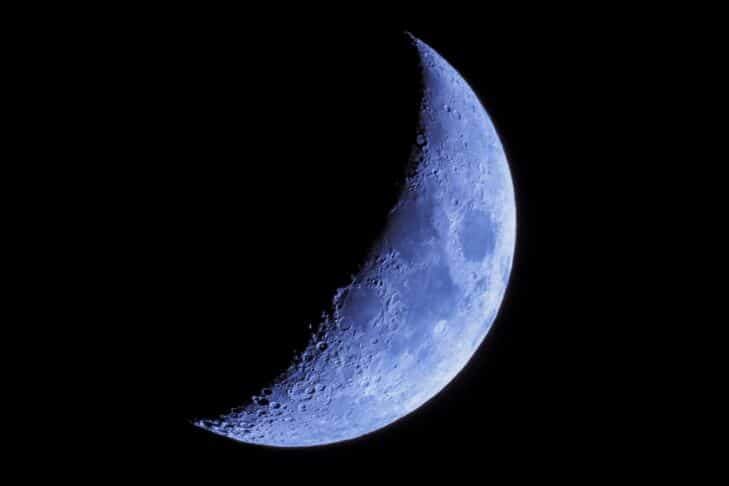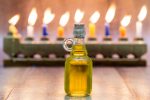Driving home a few weeks ago the crescent moon rose just above the horizon at dusk. It’s one of the more beautiful things to see in the night sky, a shimmering slice of moonlight that seems to be holding the outline of the moon right above it.
The beauty of this ghostly apparition at first glance feels like an illusion of negative space, but then you realize that you can actually see the complete outline and contours of the full dimly-lit orb above the crescent moon. What’s even more interesting is that what you see is actually earthshine, the dark side of the moon reflecting the light of the earth. And what’s even more interesting is that this is the only time you can see that side of the moon, for as the month goes on, we see more of its illuminated side. And perhaps the most interesting is when the moon is truly new, you can’t see anything at all and the dark side is invisible. Ironically, or perhaps intentionally, it is on those darkest nights of Chanukah, when the moon has gone from crescent, to invisible, to a crescent again, and we are faced with its dark side, that our chanukiyot are the most brightly lit.
Beyond the astronomical interest in this celestial phenomenon (cue the talmudic takes on the “greater” and “lesser” lights), the low-lying crescent is a reminder that everything has a dark side. The moon. Us. And this month, yes, Chanukah.
Chanukah, just like but perhaps more so than any other Jewish holiday, has gone all in on the mythology. It is a holiday that reads like a graphic novel—Judah Maccabee! War elephants! A miracle of oil! The good guys win!
Well, sort of. Some of that happened—there were definitely Maccabees, there was some clever guerilla warfare practiced in the narrow mountain passes of Judaea, and there were probably elephants. But actually, there was most likely no miracle of oil, the holiday was designed to be a postponed version of Sukkot, and some extremist Jews killed a bunch of more secular ones.
Take your pick of source material—the apocryphal Books of Maccabees, Josephus, Talmud Shabbat 21b, or dig deep on all of those in this academic piece. The sidebar of a Jewish civil war in which the zealots face off against the assimilationists is enough to make one prefer a tamer…whitewashed…uh…fictional retelling of the history, one in which Jews are not killing fellow Jews and are only picking off Seleucids and rampaging war elephants.
A casual celebrant of the upcoming holiday might equate the Maccabees with the Haganah during Israel’s War of Independence. A more nuanced celebrant might feel like they were more like the Irgun. But might they have been more like Yigal Amir? Or Itamar Ben-Gvir? After all, once they were in power, the Hasmoneans did not cover themselves in glory, and persecuted assimilationists until the day the Romans waltzed in. Don’t be fooled, though—the history of Jewish survival, especially around Chanukah, makes you wonder if the ends truly justified the means. I mean, we’re still here, so I guess the answer is yes? But is it? What are we really celebrating?
Related
Don’t worry, though. I’m not here to kill off all of our collective joy and celebration—go ahead and kindle your chanukiyot, fry your latkes, and spin your dreidels until the cows come home. Grab a festive drink at a pop-up Chanukah bar, sing your favorite songs as the candles burn low, and above all, shine some positive light in a dark time for Jews. We could use some good times.
And while that’s a throw-away, evergreen reminder, despite the glow of its light, warmth, and celebration, Chanukah might actually be a history worth studying in darkness.
This post has been contributed by a third party. The opinions, facts and any media content are presented solely by the author, and JewishBoston assumes no responsibility for them. Want to add your voice to the conversation? Publish your own post here. MORE





